I wish I could explain why it happened, but I can’t. From the time I hit my teen years there was friction between my father and I. I know that friction between and father and teenage son is a cliché, but it was intense and, to this day, I do not know where it came from.
As I grew older, I remember my father telling a story to his friends about the first time I was, as he put it, “unimpressed with him.” I have many vivid memories dating back to when I was three years old. I remember the presents I got for my third birthday; a cement truck with real, rotating reservoir and an ice cream truck with a working rear door and a tiny little display of the different ice creams in the truck. Trucks were metal in those days and I had those two trucks for many years. I can’t imagine the mileage I put on them back and forth on our walkway and the sidewalk in front of our house.
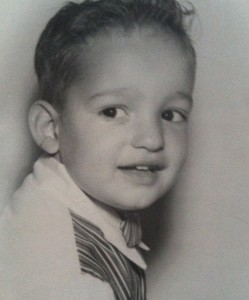
I’m probably about 2 here.
My father’s story was that, whenever I saw him drive up the street, I’d drop whatever I was doing and run to see him. He said he could clearly remember the first time he waved to me from his car and I just waved back, returning to my trucks. He told the story often and, coupled with my memory, I can swear I remember that event, too. I can see him, with his red and white mercury coupe, slowed almost to a standstill, his face beaming and him waving to get my attention. And I, not wanting to be interrupted from my playing, just flipped a backhanded wave in his direction. His version was that my wave was accompanied with a yeah, yeah, I’m busy expression on my face. And it probably was.
And I do have memories of being that age and impatiently waiting for him to come home from work; probably driving my mother nutty with questions every fifteen minutes as to, “How long ‘til Daddy gets home?” If you’re of my generation, the post-war boomers, most of the mothers in the neighborhood stayed home and raised the kids while the fathers went off to work each day. So, seeing Daddy was more special. I remember a couple of instances when all six of us rushed to the front door as he came in. Each of us filled with news of our adventures during the day and we each wanted to be first to get his attention and share our exploits with him. We swarmed around his legs, sometimes I swear, nearly toppling him. “Can you wait until I get inside the door?!” he frequently complained.
We’d follow him, en masse, down the hallway, leaving my mother in the kitchen, no doubt with a sigh of relief. We’d follow him into his bedroom, all talking at the same time, each wanting father’s approval of our daily escapades; each subconsciously wanting Daddy to tell us we were the best.
The years passed and I grew into a teen. I’m not sure of the exact biological function that causes this to happen, the world of biochemistry being beyond my grasp, but, when a child reaches their teen years, their brains take on the amazing ability to actually know everything! They especially know more than their parents.
Though much of the problems stemmed from me being a teenager, my father was not without fault. My relationship with him went from a relationship between a son and his hero to that of a father with a son who could do nothing right. I will not try to claim that I wasn’t a typical teen. I’m sure I was. But once I reached puberty and began to develop into an individual, it seemed to me that I could do nothing right for my father. If I did not mow the lawn, he’d be on me for that. If I did mow the lawn, I’d be in trouble because he had to remind me. If I mowed the lawn without being reminded, I should have mowed it sooner or done the edging straighter.
Everything I tried was not good enough for him or was not in the direction he wished for me in my life. I got a lot of pressure to play golf and, in another story, I could relate to you the good things that came from playing golf and the magical times I did get to spend with my father in his later years. But he’d had a friend who became a professional golfer, winning a PGA Major, and since my father did not get to pursue the same dream, he decided that he would encourage me to have that dream.
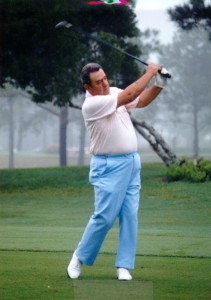
The years took their toll on his swing…
I did like playing golf, actually, but I did not take it as seriously as he wanted me to and it added to the growing list of frictions between us. When I played with my friends, it was a lot of fun. When I played with my father, it was four hours under a microscope. Four hours with a prison guard. Four hours with a lion tamer and his whip. I’d be lining up a shot, and he’d be standing next to me, shaking his head (so I learned from others who were watching). I’d hit the shot—miss the shot is a better description—and he’d say, “I knew you were going to do that!”
At first, it is mildly annoying, like you might feel when someone rubs sandpaper inside your eyelid. It quickly becomes infuriating. As I think back on those times now, I wonder why I didn’t just clobber him with the particular club I had in my hand at the time. Actually, I would never dare strike my father. He never, as far back as I can remember, hit me. But until this one particular argument, I did not want to find out if he would. And there were times I probably had it coming. But I would get so mad at him for standing over me and criticizing me after the shot, instead of telling me before hand what he saw as incorrect in my set-up or practice swing.
As if it were yesterday, I can still see me skull-slicing a three wood on this particular par 5, and him saying, “I knew you were going to do that!” Without even looking at him, I angrily yanked my golf bag from the ground, jammed my club inside, and, slinging my bag on my shoulder, stormed away from him. Looking across the fairway to the left, I saw my friend hit his shot, his father shake his head and say something, and my friend grab his bag and walk away from his father the same way I had done three steps earlier. “What a wonderful Father/Son day we’re having,” I said out loud to no one in particular, but hoping my dad would hear me.
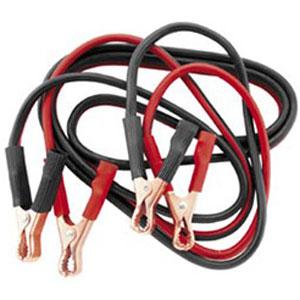 Again, I want to take responsibility for my part in our dynamic. I remember one time in my junior or senior year of high school. I had borrowed his car and gone across town to my girlfriend’s house. I was supposed to be home by ten, but I didn’t want to leave her so early and I stayed longer. I got home at sometime past 11. I explained to my parents that the car wouldn’t start and I had to jiggle the battery cables a bunch of times to get the car to start.
Again, I want to take responsibility for my part in our dynamic. I remember one time in my junior or senior year of high school. I had borrowed his car and gone across town to my girlfriend’s house. I was supposed to be home by ten, but I didn’t want to leave her so early and I stayed longer. I got home at sometime past 11. I explained to my parents that the car wouldn’t start and I had to jiggle the battery cables a bunch of times to get the car to start.
The next day my father came up to me and said, “I know your mother bought your story hook, line and sinker, but I don’t believe it for a minute. Your hands weren’t even dirty when you came in last night…” He went on to list a few of the other reasons he suspected me of fibbing, but I don’t recall right now. All I knew is that I grew immediately indignant. How could he accuse me of lying to him?! He restricted me from the car for a few days or some minor punishment, but that all paled in comparison to the fact that he was calling me, his own son, a liar. And he did it to my face!
For days I couldn’t get over it. It stuck with me and rolled around in my stomach, night and day, for about three days. I quietly seethed and fumed. I am an honest person! I could not get past the contempt he showed for my honesty. How could he possible accuse me of lying?!
Oh yeah. I was lying.
That realization hit me in the face like a cold washcloth. I think I even laughed out loud. Well, I wasn’t going to admit it to him, there’s no way I could give him the satisfaction or admit to him that I had, indeed, been lying. But I have used that example to myself over the years to remind me to accept responsibility for my actions; for my part in situations in which I found myself.
Unfortunately, other conflicts and confrontations we had did not always fade so conveniently.
And I do not want to come off as a whiner here. I know other guys whose fathers threw them to the ground and/or kicked them in the stomach for poor grades or some other indiscretion. But my Dad was constantly on my case, always criticizing or belittling me. And as far as I could tell, he was mostly mad at me for not being him. At times I wondered if he was jealous of my youth and the life I had before me. Many times I heard him talk of his friend who went on to play professional golf while my Dad had chosen to get married and have a family. I often felt as if he longed for the life for which he had not tried, the road he had not chosen and, instead, regretted the path he had walked. And, most of the time, I felt he was taking it out on me.
But he chose to get married and have a family and move out to California, at the urgings of my mother. And he worked in aerospace and supported my mother and the six of us.
But in the early 1970’s, there were massive layoffs in the aerospace industry and my father was not invulnerable to the ax. He, along with tens of thousands of Americans who had worked on our exploration of space and our race against the Russians to the Moon, were unceremoniously laid off.
At this time, I was in high school. I am the eldest of their brood, and my father had the usual obligations, mortgage, utilities, food, etc. And there was his wife and six children. And there was no income.
It was with great shame that he stood in line, face towards the ground, to collect an unemployment check. He took work wherever it was offered. Here was my father, a man who hadn’t lifted anything heavier than a pencil at work for the last 15 years, now working in a quarry, throwing 100-pound bags of rock. Or crawling on his hands and knees to install carpet in motor homes.
I really don’t know all that he did, or all of the indignations he suffered. I was a teenage boy and I had my own life and agenda. What I cared about was getting through my school day so I could play golf on the school team, then talk with my girlfriend for hours on the phone. Or wait until he got home from work and ask if I could borrow the car so I could go see her.
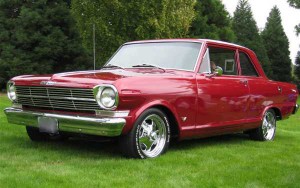 I’m sure that must have made him mad and/or jealous of my carefree attitude. But I was a teenager. I did not have any concept of what he was going through. But he did what he could to keep us fed and with a roof over our head. He did whatever he could. And though we were not rich, we were never without food, clothing or shelter.
I’m sure that must have made him mad and/or jealous of my carefree attitude. But I was a teenager. I did not have any concept of what he was going through. But he did what he could to keep us fed and with a roof over our head. He did whatever he could. And though we were not rich, we were never without food, clothing or shelter.
Standing over his casket, all of these memories and more were flooding back in torrents. At the age of 46, I did have a better idea of the responsibilities and obligations that had pressed down upon him. But you can still never know what another person is feeling, nor the desires and agendas that motivate their actions and decisions.
At his funeral, I did have a different perspective than I’d had as an arrogant teen. And, having lived a little bit of life, my share of its ups and downs, its joys and sorrows, I could relate to my father from a different perspective, not as my father, who at one time had seemed invincible in my eyes, but as another person, another individual on his path, just as was I.
I cannot remember my eulogy for him. I’d had nothing planned and spoke about whatever came to my mind. I broke down a few times, crying into the golf towel I’d brought up with me as a tribute to the game we’d shared. After the tears, I continued as best I could to honor my father.
My eyesight had grown steadily worse for me with my advancing years. I wore my contact lenses round-the-clock, the consequential edema causing my eyesight to be even worse. That, coupled with days of crying leading up to and the emotions of the funeral, made the sea of faces in the church nothing more than blotches of color as if they were all a living Claude Monet painting.
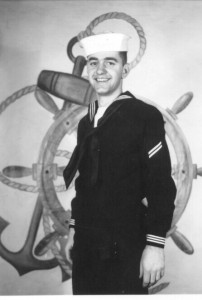
My Dad in the early 1950’s
And through all of this whirling color, I saw my eldest son, or, at least, the outline of his features. He was sitting in the second row, behind my siblings. And due to my limited eyesight, what I saw of him was his outline, the shape of his body and head, the shape of his face surrounded by his hairline. And his outline looked exactly like a picture of my father, taken at about the same age as my son was then. It hit me hard the first time I noticed it, causing me to stop in mid-sentence. But I pressed on.
As I talked, I looked at my son and saw my young father watching and listening. I saw my father, still alive in my son; the DNA handed down, the family legacy continued, I saw my father living on.
Later, with my siblings in the limo ride to the cemetery, I couldn’t get that image from my mind, the face of my son and my father watching me. The first reaction was of my ego, the thought was that they were both watching and judging me, but that quickly passed. What I felt next was being surrounded by love. The feeling flooded over me, my link in this chain, being loved by the adjoining links.
Suddenly, for some reason, another memory crashed into my thoughts.
I had been in high school at the time. The family was at the dinner table, my parents at either end, we children sitting, three across, down the sides. I was immediately to my father’s left. He was mad at me, lecturing me for something and I was being resistant. Obtuse is probably a better word.
At one point, in his anger with a smart-assed answer I’d given him, said, “If you weren’t wearing glasses, I’d pop you in the mouth!” So, I took off my glasses and stared at him, waiting. After about ten seconds, I put my glasses back on with an air of triumph. Don’t make threats you’re not willing to carry out! He didn’t say a word, and he remained silent for the rest of the meal. My mother was stunned.
For days I’d strutted around like some prize rooster. I’d gotten the better of him and his hollow threats. That will teach him to mess with me…
Over the ensuing decades, my mother brought up the incident a few times, always when my father was not around. “That time when you took off your glasses for Daddy?! I thought I was going to swallow my tongue!”
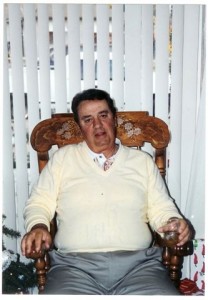 And now, all those decades later, riding in the limo behind his hearse, I recalled that incident as if it were happening right then. I realized the tremendous disrespect I had shoved into my father’s face. I thought, “If my son did that to me, I’d smack him right across—” At that instant I pictured my son’s face from earlier in the day. I felt again all of the love I have for him, all of the unconditional love, which would always be there no matter what he did.
And now, all those decades later, riding in the limo behind his hearse, I recalled that incident as if it were happening right then. I realized the tremendous disrespect I had shoved into my father’s face. I thought, “If my son did that to me, I’d smack him right across—” At that instant I pictured my son’s face from earlier in the day. I felt again all of the love I have for him, all of the unconditional love, which would always be there no matter what he did.
“I could never strike my son!” I thought.
And then I felt as if the wind had been knocked out of me.
Following that event so many years ago, I’d been so proud of my defiance. Even as the tribulations of youth faded into the past, somewhere in my psyche was a prideful resonance that I hadn’t let my father get the better of me.
It was in that instant that I knew why my father hadn’t smacked me in the mouth with a backhand I’d so richly deserved. It was at that instant that I understood so very much about my father. It was then, in that incident of all things, that I realized how much he loved me. No matter how he treated me, how cruel some of it felt to me, in his way he wanted what he thought was best for me. He really did love me.
And it was at that instant that I realized my father was a better man than I.

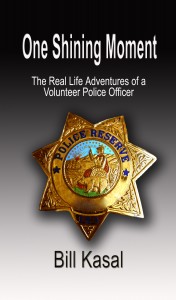
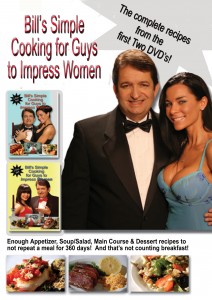
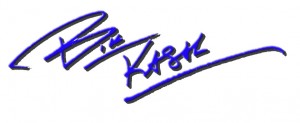
What a great heartwarming story!!! I can relate to alot of it!
Thank you, Anna! The struggles of parent & child are almost Universal!
Won’t hide it Bill, crying as usual after reading one of your stories. You have a gift, an amazing gift. Being a single parent, doing this alone, is without a single doubt, the toughest thing I have ever or will ever do. I only hope and pray that my children will look back and still love me in the end. I hope they will be able to look back and maybe even smile or laugh when they recall memories of their childhood. This, would mean that I did something right….thank you for sharing your beautiful story.
Awww, Constance, thank you. I have always wanted to be a writer, but lacked confidence, basically thought I had no talent, nor did I have any idea what to write about!
So, at my old age, I decided to start a blog and force myself to write about whatever came to what’s left of my mind. That way I won’t wake up dead someday and regret not giving it a shot. It’s comments like yours that offer encouragement!
I have doubts, as well, about how I look in the eyes of my children… I think many of us do. But all you can do is remember that they are people, too, and, as evidenced by this blog post, kids will remember things for quite awhile. No matter what we do, we’ll make mistakes. I just hope my kids know that I am human, I love them more than anything, and I did the best I knew how at the time.
My final words for my Father’s eulogy were, “…and like my father before me, I’ll do the best I can…”
Thank you for commenting!
That is a beautiful story about your Dad. I had no idea you felt so strong about him, Bill. Frank never told me that version of your life with your Dad. I’m so glad that you had the good times and I know Frank would have been happy to hear about your feelings (and so would your Mom).
You do have quite a talent for writing!
Jeanne, thank you for taking the time to comment. I, too, wish Uncle could have read this. I hope you are well!
Your lucky, my dad would have struck me through the glasses which I wore from the 7th grade. Isnt amazing after all these years of not knowing why we finally realize why. Good story and you told it well. Brent
It is, Brent. Thank you.
Bill…
This is so beautifully written. He DID love you dearly.Carry his loving memory with you always.Remember the good times…let the rest fade…Thank you for sharing!!!
Thank you, Billie Anne!
Thank you for sharing the very initimate snapshots of your life. I admire your gift of “story telling” so eloquently written. I hear your voice as I read your words.
Thank you, TJ. It means a lot to me that you took time to read and comment!